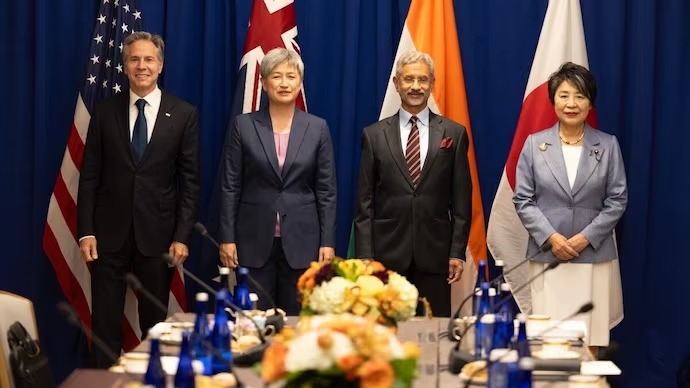New York, September 23: At the sidelines of the UNGA, the Quad foreign ministers emphasized the utmost importance of respecting the sovereignty of all nations. This reaffirmation, though thinly veiled, was directed at concerns surrounding China’s actions.
They expressed deep concern over the militarization of disputed areas, the use of coast guard and maritime militia vessels, and attempts to disrupt other countries’ offshore activities.
The Quad, composed of India, Australia, Japan, and the United States, established in 2017 to counter China’s assertiveness in the Indo-Pacific region, convened its foreign ministers—S Jaishankar, Antony Blinken, Penny Wong, and Kamikawa Yoko—during the UN General Assembly’s 78th session.
In a joint statement, they stressed the significance of international law, sovereignty, and territorial integrity, along with the necessity of peaceful dispute resolution.
Adherence to international law, particularly the United Nations Convention on the Law of the Sea (UNCLOS), was emphasized, particularly in the context of maritime claims in the South and East China Seas.
Furthermore, the ministers reiterated their commitment to freedom of navigation and strong opposition to any unilateral efforts to change the status quo through force or coercion.
Concerns were raised about the militarization of disputed regions and attempts to disrupt offshore activities, which can be seen as references to China’s actions.
The Quad remains steadfast in its commitment to a free, inclusive, and resilient Indo-Pacific, advocating for principles such as freedom, the rule of law, and peaceful dispute resolution while opposing unilateral attempts to alter the status quo.
As China’s military activities in the Indo-Pacific gain attention, this region has become a focal point for global powers.
The United States, in particular, has shown interest in transforming the Quad into a security alliance to counter China’s growing assertiveness.
China’s territorial disputes in the South and East China Seas, as well as its militarization of artificial islands, have raised concerns among neighboring nations.
The Quad also voiced support for a stable and prosperous Indo-Pacific with effective institutions, and they expressed unwavering support for ASEAN’s unity and centrality.
They respect regional organizations such as the Pacific Islands Forum (PIF) and aim to strengthen cooperation with partners in the Indian Ocean region.
In addition to regional matters, the Quad ministers expressed deep concern about the ongoing conflict in Ukraine and its humanitarian consequences. They emphasized the need for a comprehensive and just peace in accordance with international law.
The ministers also addressed global food security and rejected the use or threat of nuclear weapons within the context of the war.
These discussions took place as External Affairs Minister S Jaishankar arrived in New York for the UNGA session. In a tweet, Antony Blinken underscored the importance of the Quad in shaping a free and open Indo-Pacific and reaffirming their commitment to the UN Charter’s principles.






